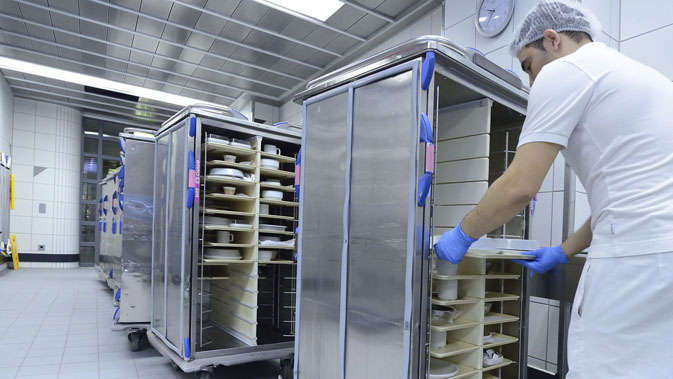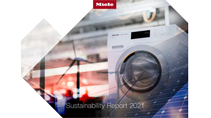Press releases
Large washer in hospital kitchen: Germs don't stand a chance!

Marienhospital in Stuttgart now disinfects its food trolleys
Between breakfast and lunch, business is brisk in the large central kitchen at the Marienhospital in Stuttgart. Loads of dirty crockery are processed by the minute, ready for a local Swabian dish to be served for lunch. And food must be served piping hot, together with a fresh side salad and a chilled dessert. That's why food is distributed to wards in food delivery carts which keep hot food hot and cold food cold – and are cleaned just as thoroughly as plates and cups. The hospital relies on the latest technology, already used in many hospitals to reprocess containers and trolleys used to transport surgical instruments.
These 'meals-on-wheels' trolleys stand 1.60 m tall and consists of two separate compartments: In the one compartment, salads and desserts are kept cool at a temperature of 10°C for 2 hours; in the other a fan heater with a temperature of 110°C keeps food piping hot for a similar length of time. Spillage of hospital food is virtually impossible to avoid: 'If trolleys are jolted, blended food and liquids easily find their way into the racks which hold the trays, and bake on', says kitchen manager Danny Williams.
And, to combat not only food residue but also germs, the Marienhospital has invested in a large-chamber trolley washer from Miele Professional. This unit cleans and disinfects all the bulky items in the kitchen which are too big to fit into a regular commercial dishwasher: This includes not only the 40 or so food delivery carts but also plate dispensers, tables and tray trolleys. 'The system is in operation the whole day long', says chief home economist Ulrike Rupp, pointing at the display showing running times. A standard wash cycle for trolleys at temperatures between 60°C and 85°C lasts 6.37 minutes, disinfection included. 'This fits in perfectly with our other processes as we would not be able to hang around, waiting for a programme lasting a quarter of an hour to finish'.
No-one is willing to cut corners when it comes to hygiene, explains kitchen manager Williams. 'Our trolleys serve all wards, and, on the way there, are exposed to hospital bacteria. For us, hosing them down or using a pressure cleaner is not an option'. The risk of cross-contamination must be safely eliminated. Some 15 years ago, first attempts were made to clean carts manually, Williams concedes, but it soon became clear that an automatic, machine-based approach was needed. After initially opting for equipment which was somewhat prone to failure, it fell to Miele around 2 years ago to supply a new system.
The current dishwashing room was designed by GHL Engineers in Bad Schussenried. After a hospital in Ravensburg, the Marienhospital was the second infirmary which the owner Günter Laubheimer equipped with a system of this nature. 'For one thing, the Miele system has the benefit of not having moving parts visible on the inside and is therefore less susceptible to breakdowns. Secondly, it produces only 550 m³ of waste air per hour, only around one-fifth of comparable systems from other suppliers'. Armed with these facts, Laubheimer soon had the decision-makers at the Marienhospital on his side. 'If air throughput had been any higher, we would have had to install completely new ventilation ducting', says home economist Rupp. For a complex comprising 17 specialist clinics with 761 beds treating more than 100,000 patients a year including outpatients, this would have required massive investments.
The fact that the 65 employees in the kitchen place such great store by hygiene and go to such lengths in logistics reflects the quality philosophy of the hospital. And this has not gone unnoticed by patients, either: In a 2017 list of top German clinics compiled by the Focus current affairs magazine, the Marienhospital in Stuttgart counts among the top 80 in the country.
(656 words, 3,984 characters incl. spaces)
Company profile: Miele is the world's leading manufacturer of premium domestic appliances including cooking, baking and steam-cooking appliances, refrigeration products, coffee makers, dishwashers and laundry and floor care products. This line-up is augmented by dishwashers, washer-extractors and tumble dryers for commercial use as well as washer-disinfectors and sterilisers for use in medical and laboratory applications (Miele Professional). The Miele company, founded in 1899, has 8 production plants in Germany as well as one plant each in Austria, the Czech Republic, China and Romania. 2015/16 turnover amounted to approx. EUR 3.71 bn with sales outside Germany accounting for around 70%. Miele is represented with its own sales subsidiaries and via importers in almost 100 countries. The Miele company, now in the fourth generation of family ownership, employs a workforce of around 19,000, 10,500 thereof in Germany. The company headquarters are located in Gütersloh/Westphalia, Germany.
Download as PDF Download incl. media (zip)
Anke Schläger
+ 49 5241 89-1949
anke.schlaeger@miele.com
Media information
| Description | Download |
|---|---|

Shortly after breakfast: An employee at the Marienhospital removes trays with dirty crockery from a food delivery cart. |
High Resolution TIFF |
| High Resolution JPG | |

Food delivery carts queue up for washing. |
High Resolution TIFF |
| High Resolution JPG | |

Fully installed and approved: Planner Günter Laubheimer, home economist Ulrike Rupp and kitchen manager Danny Williams (from left to right). |
High Resolution TIFF |
| High Resolution JPG | |

Lunch time: A well-rehearsed team consisting of 65 employees, some full-time and some part-time, serves food onto plates and into soup bowls, before it is whisked away to the wards. |
High Resolution TIFF |
| High Resolution JPG | |

Hot food goes into the compartment on the right; cold food on the left. The trays are also compartmentalised, as are the food delivery carts which service the wards several times a day. |
High Resolution TIFF |
| High Resolution JPG | |

Switch-on: The container washer from Miele Professional starts the day with a self-cleaning cycle lasting around 6.5 minutes. |
High Resolution TIFF |
| High Resolution JPG | |

The Stuttgart Marienhospital – a complex comprising 17 specialist clinics – treats more than 100,000 patients a year, including outpatients. |
High Resolution TIFF |
| High Resolution JPG |


